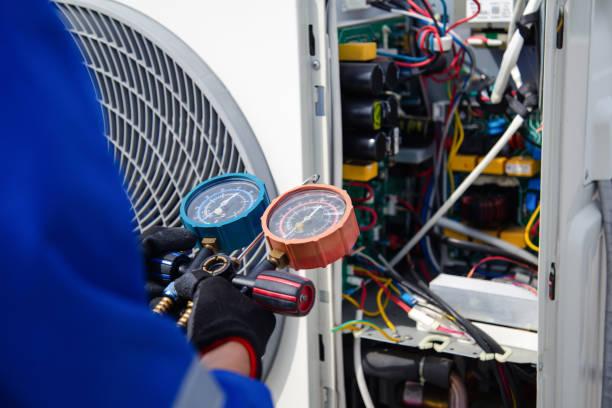The Future of HVAC Systems: Smart Technology and Energy Savings

As energy efficiency and comfort become top priorities for homeowners and businesses, the HVAC system is no longer just about heating and cooling—it’s about innovation. Modern designs are smarter, greener, and more adaptable than ever before, redefining how we manage indoor environments. From advanced sensors to energy-saving automation, the future of heating, ventilation, and air conditioning promises both comfort and sustainability.
HVAC Meaning: More Than Just Temperature Control
When people hear the term HVAC, they often think only of air conditioners or furnaces. But HVAC actually means heating, ventilation, and air conditioning—a full system designed to control temperature, humidity, and indoor air quality.
This combination of comfort and health has made HVAC essential in both homes and workplaces. Now, as technology advances, these systems are becoming more efficient and environmentally friendly.
System Components: Smarter and More Efficient
A traditional HVAC system includes basic HVAC system components such as furnaces, air conditioners, ductwork, filters, and thermostats. In the past, these parts worked independently. Today, smart technology integrates them into a connected system that responds to your lifestyle and needs.
-
Smart Thermostats: Learn your habits and adjust settings automatically.
-
Variable-Speed Compressors: Adjust cooling or heating output for efficiency.
-
High-Efficiency Filters: Improve indoor air quality while reducing energy waste.
-
IoT Sensors: Monitor performance and detect issues early.
By upgrading these components, both homeowners and businesses reduce costs while improving comfort.
Residential HVAC System Innovations
For homeowners, the residential HVAC system is becoming more user-friendly and cost-effective. Smart thermostats allow remote control via smartphones, while zoning systems give families the ability to heat or cool individual rooms.
Ductless mini-splits, a growing trend in residential design, offer targeted comfort without the need for extensive ductwork. These systems are compact, energy-efficient, and perfect for older homes or new additions.
Commercial HVAC System Advancements
In larger buildings, the commercial HVAC system plays a vital role in energy management. Offices, hospitals, and schools consume massive amounts of energy, so efficiency is critical.
New designs use building automation systems that integrate HVAC with lighting, security, and power management. This not only reduces costs but also creates healthier, more productive environments. Sensors can even adjust airflow and filtration based on occupancy, making indoor spaces safer and cleaner.
Smart Technology in HVAC Design
One of the most exciting areas of growth is HVAC design that incorporates artificial intelligence (AI) and the Internet of Things (IoT). These technologies allow systems to “learn” and self-adjust in real time.
Imagine an HVAC system that lowers energy use when nobody is home or predicts when maintenance is needed before a breakdown occurs. This proactive approach saves money, reduces downtime, and extends the life of the system.
Energy Savings Through HVAC Installation Upgrades
The future also brings new opportunities in HVAC installation. High-efficiency units paired with renewable energy sources, like solar power, reduce environmental impact while cutting utility bills.
Installing smart vents, advanced insulation, and high-performance ductwork ensures that no energy goes to waste. Whether it’s a residential HVAC system or a large commercial one, better installation practices lead directly to long-term savings.
Why the Future of HVAC Systems Matters
The push toward smarter and more sustainable HVAC technology benefits everyone:
-
Lower Energy Bills – Smarter systems reduce wasted power.
-
Healthier Living Spaces – Advanced filtration improves air quality.
-
Environmental Responsibility – Energy-efficient systems reduce carbon footprints.
-
Greater Comfort – Personalized climate control keeps every space comfortable.
As more homeowners and businesses adopt smart solutions, the future of HVAC systems will be defined by efficiency, connectivity, and comfort.
Final Thoughts
The HVAC system has come a long way from simple heating and cooling, evolving into a smart and sustainable solution for modern living. Today’s advanced technology includes features like AI-driven monitoring, predictive maintenance, and energy-efficient components that adapt to your needs in real time. Smart thermostats allow homeowners to control temperatures remotely, while automation ensures energy is never wasted when spaces are unoccupied. Businesses also benefit from cleaner air, better airflow, and optimized system performance that keeps large spaces comfortable while lowering utility bills. Whether upgrading a residential setup or planning a commercial installation, investing in smarter design and high-quality installation practices ensures long-term savings, improved comfort, and a more sustainable future.
FAQs
1. How is smart technology changing HVAC systems?
Smart thermostats, sensors, and AI allow systems to self-adjust, saving energy and improving comfort.
2. What are the key HVAC system components?
Common parts include furnaces, air conditioners, ductwork, filters, and thermostats.
3. How do residential and commercial HVAC systems differ?
Residential systems focus on comfort and cost, while commercial systems emphasize efficiency for large-scale buildings.
4. Why is professional HVAC installation important?
Proper installation maximizes efficiency, reduces breakdowns, and extends system life.







